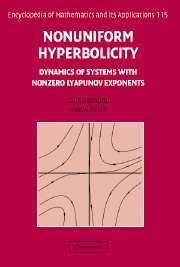
-
Select format
-
- Publisher:
- Cambridge University Press
- Publication date:
- 05 May 2013
- 03 September 2007
- ISBN:
- 9781107326026
- 9780521832588
- Dimensions:
- (234 x 156 mm)
- Weight & Pages:
- 0.99kg, 528 Pages
- Dimensions:
- Weight & Pages:
You may already have access via personal or institutional login
Book description
Designed to work as a reference and as a supplement to an advanced course on dynamical systems, this book presents a self-contained and comprehensive account of modern smooth ergodic theory. Among other things, this provides a rigorous mathematical foundation for the phenomenon known as deterministic chaos - the appearance of 'chaotic' motions in pure deterministic dynamical systems. A sufficiently complete description of topological and ergodic properties of systems exhibiting deterministic chaos can be deduced from relatively weak requirements on their local behavior known as nonuniform hyperbolicity conditions. Nonuniform hyperbolicity theory is an important part of the general theory of dynamical systems. Its core is the study of dynamical systems with nonzero Lyapunov exponents both conservative and dissipative, in addition to cocycles and group actions. The results of this theory are widely used in geometry (e.g., geodesic flows and Teichmüller flows), in rigidity theory, in the study of some partial differential equations (e.g., the Schrödinger equation), in the theory of billiards, as well as in applications to physics, biology, engineering, and other fields.
Reviews
'… will be indispensable for any mathematically inclined reader with a serious interest in the subject.'
Source: EMS Newsletter
Contents
Metrics
Altmetric attention score
Full text views
Full text views help Loading metrics...
Loading metrics...
* Views captured on Cambridge Core between #date#. This data will be updated every 24 hours.
Usage data cannot currently be displayed.
Accessibility standard: Unknown
Why this information is here
This section outlines the accessibility features of this content - including support for screen readers, full keyboard navigation and high-contrast display options. This may not be relevant for you.
Accessibility Information
Accessibility compliance for the PDF of this book is currently unknown and may be updated in the future.


